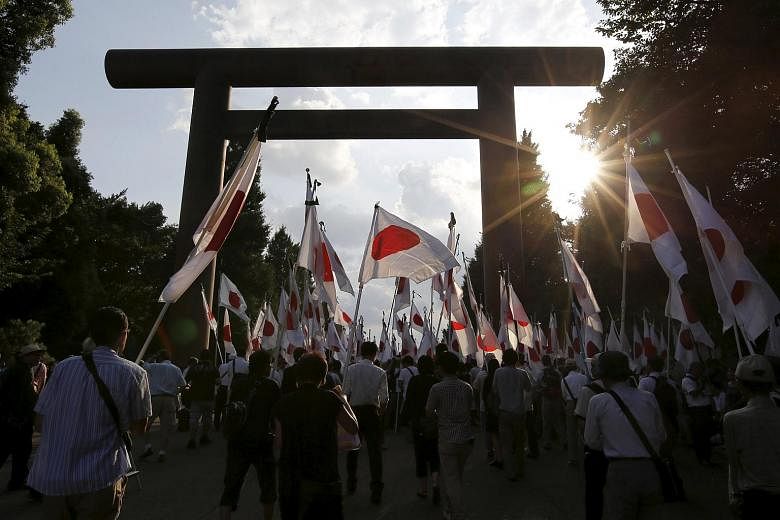Last Friday, Japanese Premier Shinzo Abe issued a statement marking the 70th anniversary of the end of World War II. It upholds the nation's perception of wartime history as outlined in a 1995 landmark apology.
Mr Abe expressed the hope that messages in the statement "will be shared by as many people as possible", but it remains to be seen whether that will happen.
Responses from China and South Korea have been less than enthusiastic, with many noting that Mr Abe did not issue a fresh apology for Japan's role in the war. It is also uncertain if the statement will serve as a basis for improved relations - even possible reconciliation - with the two nations, which suffered the most from Japan's aggression and colonial rule during and before World War II.
Mr Abe's statement retained four "key phrases" spelt out in the 1995 statement by then Prime Minister Tomiichi Murayama to mark the 50th anniversary of the end of the war: "deep remorse", "heartfelt apology", "aggression" and "colonial rule".
Although Mr Abe cited these phrases, he did not issue a fresh apology of his own. This was a deliberate move - to strike a balance between his core nationalist supporters, who called for an end to so-called "apology diplomacy" with China and South Korea, and other groups who demanded that he not deviate from Japan's official interpretation of wartime history as laid out by Mr Murayama.
Reports suggest that Mr Abe had initially signalled a desire to depart from the 1995 statement. In April 2013, he told a parliamentary session that his Cabinet "does not mean to inherit the Murayama statement entirely".
He also said the word "aggression" has no established definition in academic circles or internationally, fuelling suspicion that he might seek to play down Japan's wartime acts.
Such controversial remarks and the stated desire to issue a "future-oriented" statement had raised concern that Mr Abe's own statement last week might water down the 1995 statement.
However, a sharp fall in public support rates for Mr Abe's Cabinet, due to disputes over national security Bills that are currently under deliberation in Parliament, apparently prompted the premier to be cautious about taking an aggressive diplomatic stance that could spark a backlash in Japan and abroad.
The detailed process behind the compilation of the Abe statement was not immediately known, but Mr Mito Kakizawa, the secretary-general of the opposition Japan Innovation Party, said last Friday: "I suspect this development significantly influenced discussions about finalising the shape of the statement."
He was referring to the fall in support rates, which dropped to the 30 per cent level last month, from some 50 per cent in April.
"The administration appears to have developed the sense that the statement must show (Japan's) attitude to face up to the past and contribute to peace in the Japanese way (or non-military way) in the wake of strong criticism and concern from the public," Mr Kakizawa told reporters.
He hailed the Abe statement as being "balanced".
Mr Abe agreed to calls made by dovish lawmakers from his own Liberal Democratic Party (LDP) and its coalition partner - the moderate, Buddhist-backed Komeito party - to clearly uphold the 1995 statement.
Komeito requested that Mr Abe issue "a statement that would contribute to improved ties with China and South Korea".
Greater unity within the LDP and increased cooperation with Komeito would certainly be essential as Mr Abe leads the ruling coalition into national elections for the Upper House of Parliament, slated for next summer.
At the same time, Mr Abe showed consideration for his core supporters, who have urged him not to bow to repeated demands from Beijing and Seoul for another official apology.
"We must not let our children, grandchildren and even further generations to come, who have nothing to do with that war, be predestined to apologise," the statement said, effectively declaring Mr Abe's resolve to end the so-called apology dispute.
The pronouncement came after a telephone poll on Aug 8 to 9 by the Mainichi Shimbun daily. Of the 1,015 respondents, 44 per cent said Japan had apologised sufficiently to neighbouring countries over World War II, while 31 per cent said it had not. Thirteen per cent said they saw no need to apologise.
Calling the Abe statement "reasonable", Mr Kiyoyuki Seguchi, the research director of the Canon Institute for Global Studies, a Tokyo-based think-tank, said he believed it would be received well in Japan and the international community, but it marked only the beginning. What matters next are concrete actions, he said.
"A feeling of distrust of Prime Minister Abe runs deep among the people in China and South Korea - I don't think one single statement can solve such emotional issues.
"To enhance the significance of this statement, it is extremely important that Prime Minister Abe and other leading Japanese officials sincerely practise messages carried in the statement through specific actions and speeches."
• The writer is assistant editor of the world services section in the international department of Japanese news agency Kyodo News.

